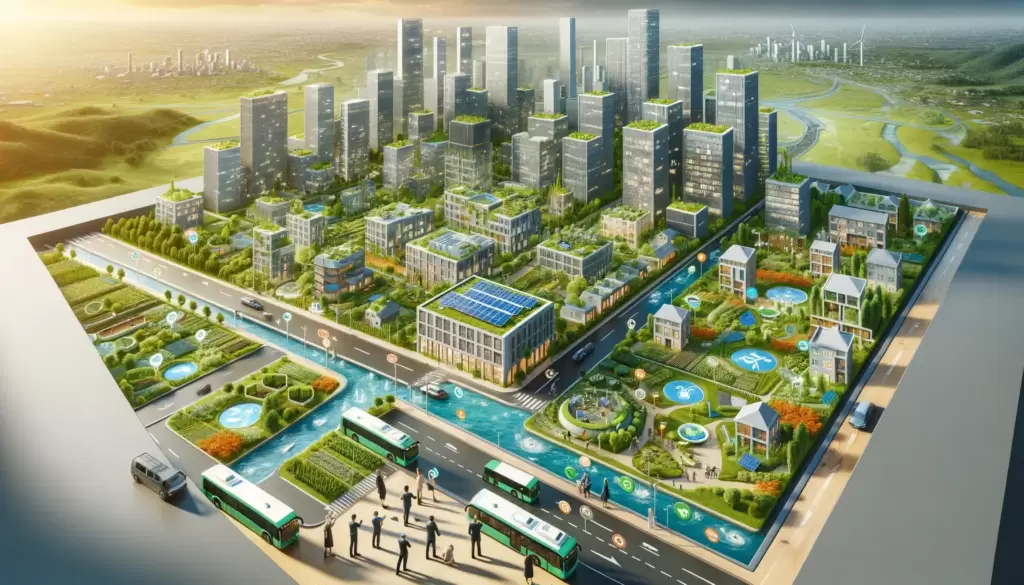
Table of Contents
Sustainable Urban Planning Strategies
Sustainable urban planning strategies play a pivotal role in creating livable, resilient, and future-proof cities. One such strategy involves prioritizing mixed land use to reduce commuting distances and promote walkability, ultimately decreasing pollution and traffic congestion. Additionally, integrating green spaces within urban landscapes not only enhances aesthetics but also contributes to improved air quality, reduced urban heat island effect, and increased biodiversity. Furthermore, embracing transit-oriented development can help shape vibrant communities by providing easy access to public transportation and reducing the dependency on individual car usage.
Another critical aspect of sustainable urban planning is fostering community engagement and participation in decision-making processes. Empowering residents to contribute their insights and ideas can lead to more inclusive designs that cater to diverse needs while promoting social cohesion. Moreover, the implementation of smart city technologies has the potential to optimize resource management, improve energy efficiency, and enhance overall infrastructure sustainability within urban environments. Embracing innovative solutions like digital twin simulations can offer valuable insights into future developments while minimizing potential risks and environmental impacts.
Understanding Sustainable Urban Planning
Sustainable urban planning encompasses a holistic approach to shaping cities and communities that prioritize environmental, economic, and social well-being. It involves designing cities with efficient public transportation systems, green spaces, and mixed-use developments that reduce car dependence and promote walkability. Additionally, sustainable urban planning strives to minimize waste through recycling programs and energy-efficient infrastructure to mitigate the negative impacts of urbanization on the environment.
One critical aspect of sustainable urban planning is fostering community engagement in decision-making processes. This involves empowering local residents to participate in shaping their neighborhoods, promoting inclusivity, and ensuring that diverse voices are heard in the planning and development of urban areas. Moreover, sustainable urban planning seeks to address issues of equity by providing affordable housing options, access to essential services such as healthcare facilities and education, and creating an environment where all residents can thrive regardless of socioeconomic status or background.
In conclusion, understanding sustainable urban planning involves recognizing the interconnectedness of various elements within a city – from transportation to housing, green spaces to infrastructure. By implementing strategies that prioritize sustainability and inclusivity while considering the needs of present and future generations, cities can evolve into thriving hubs that foster healthy living environments for all residents while reducing their ecological footprint.
Identifying Key Issues in Urban Development
Identifying key issues in urban development is a critical step towards implementing sustainable urban planning strategies. One of the primary challenges is balancing economic growth with social equity and environmental sustainability. Rapid urbanization often leads to increased demand for housing, infrastructure, and services, which can put pressure on natural resources and lead to social inequality within cities.
Another key issue lies in addressing the impacts of climate change on urban areas. Rising temperatures, extreme weather events, and sea-level rise pose significant threats to city infrastructure and public health. Urban planners must consider these environmental risks when designing resilient cities that can withstand future challenges. Additionally, promoting inclusivity and diversity in urban development is vital for creating vibrant and equitable communities. This involves prioritizing affordable housing, accessible public transportation, and green spaces that cater to the needs of all residents regardless of their socioeconomic status or background.
Implementing Sustainable Practices in Urban Areas
Urban areas are at the forefront of environmental challenges, but also hold incredible potential for sustainable innovation. By integrating green spaces, implementing energy-efficient buildings, and promoting public transportation and cycling infrastructure, cities can significantly reduce their ecological footprint. Additionally, rethinking waste management through recycling programs and composting initiatives can greatly contribute to creating more sustainable urban environments.
Moreover, involving communities in sustainable practices is essential for long-term success. By fostering community gardens, organizing educational workshops on sustainability, and encouraging local businesses to adopt eco-friendly practices, cities can harness the collective power of their residents toward achieving a more sustainable future. In doing so, urban areas can become models of environmental stewardship that inspire other regions to follow suit.
Engaging Community Participation in Urban Planning
Engaging community participation in urban planning is crucial for the success of sustainable development strategies. Involving local residents, businesses, and organizations in the planning process ensures that their voices are heard and their needs are considered. By facilitating open dialogues and gathering input from diverse stakeholders, urban planners can gain valuable insights into the specific challenges and opportunities within a community.
One innovative approach to engaging community participation is through the use of digital platforms and interactive tools. These technologies enable planners to reach a wider audience, gather feedback more efficiently, and encourage active involvement from individuals who may not have been able to participate in traditional town hall meetings or workshops. Furthermore, fostering a collaborative environment where citizens feel empowered to contribute their ideas can lead to more inclusive and equitable urban planning outcomes.
Evaluating the Impact of Sustainable Strategies
When evaluating the impact of sustainable strategies in urban planning, it’s essential to consider both short-term and long-term benefits. While immediate reductions in carbon emissions and energy consumption are crucial, the long-term effects on community health and resilience should not be overlooked. Assessing the societal, economic, and environmental impacts of sustainable strategies requires a holistic approach that considers diverse stakeholder perspectives.
Moreover, it is important to utilize comprehensive metrics for evaluation rather than solely focusing on quantitative data. Qualitative factors such as community engagement, social equity, and cultural preservation play a pivotal role in assessing the success of sustainable urban planning strategies. Additionally, incorporating feedback loops into the evaluation process enables continuous improvement and adaptability in response to changing dynamics within urban environments. By embracing a multifaceted approach to evaluation, cities can better understand the true impact of their sustainability initiatives and make informed decisions for the future.
Conclusion: Advancing Sustainable Development in Urban Areas
In conclusion, advancing sustainable development in urban areas requires a multifaceted approach that integrates economic, social, and environmental considerations. This involves leveraging innovative technologies to create smart cities, promoting green building practices, and investing in public transportation infrastructure. Furthermore, collaborative efforts between government bodies, private sector stakeholders, and local communities are essential for achieving long-term sustainability goals.
It’s important to recognize that empowering citizens through education and awareness campaigns is crucial for fostering a culture of sustainability within urban environments. Encouraging participation in community initiatives such as urban gardening programs or waste reduction schemes can help build a sense of shared responsibility towards the environment. Ultimately, by prioritizing sustainable development in urban planning strategies, cities can become vibrant hubs of innovation while preserving natural resources for future generations.




